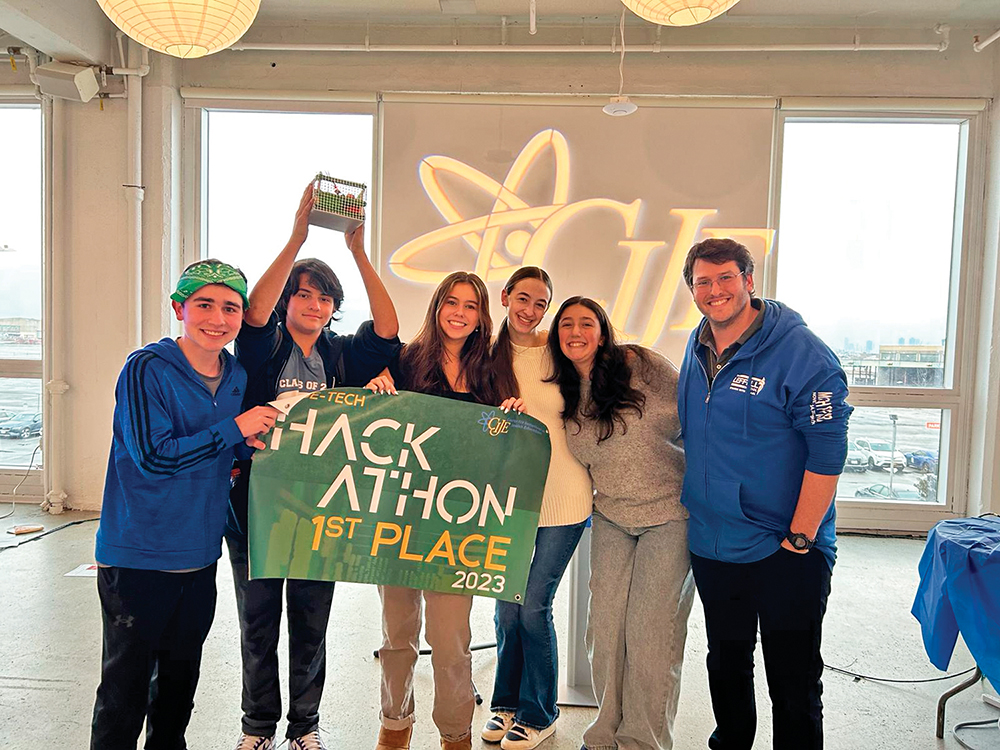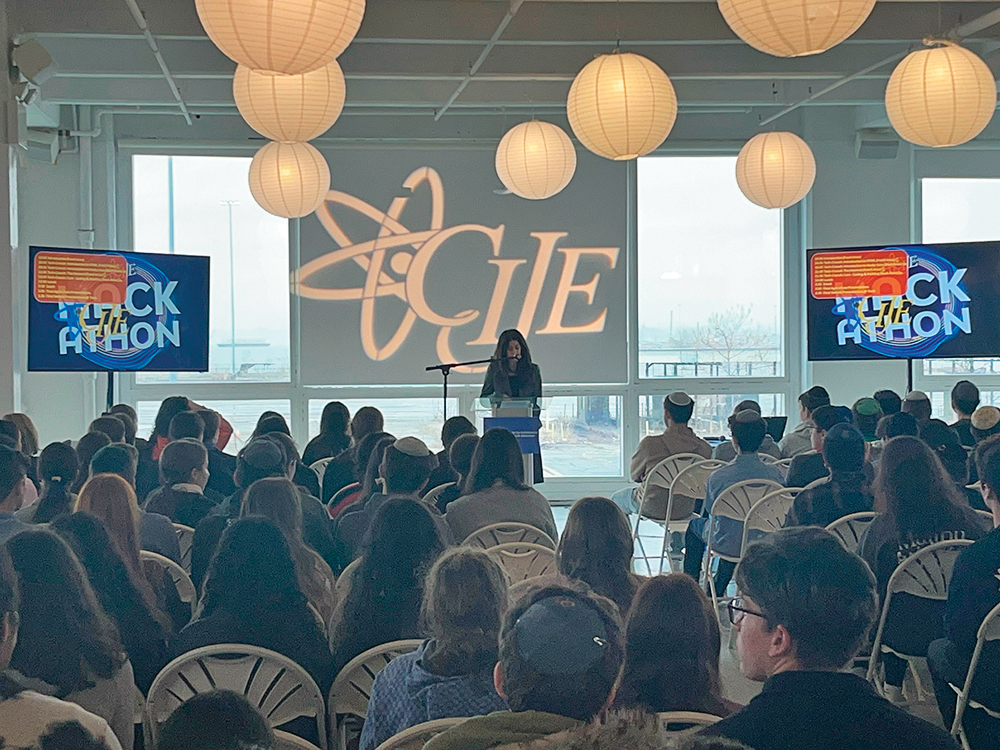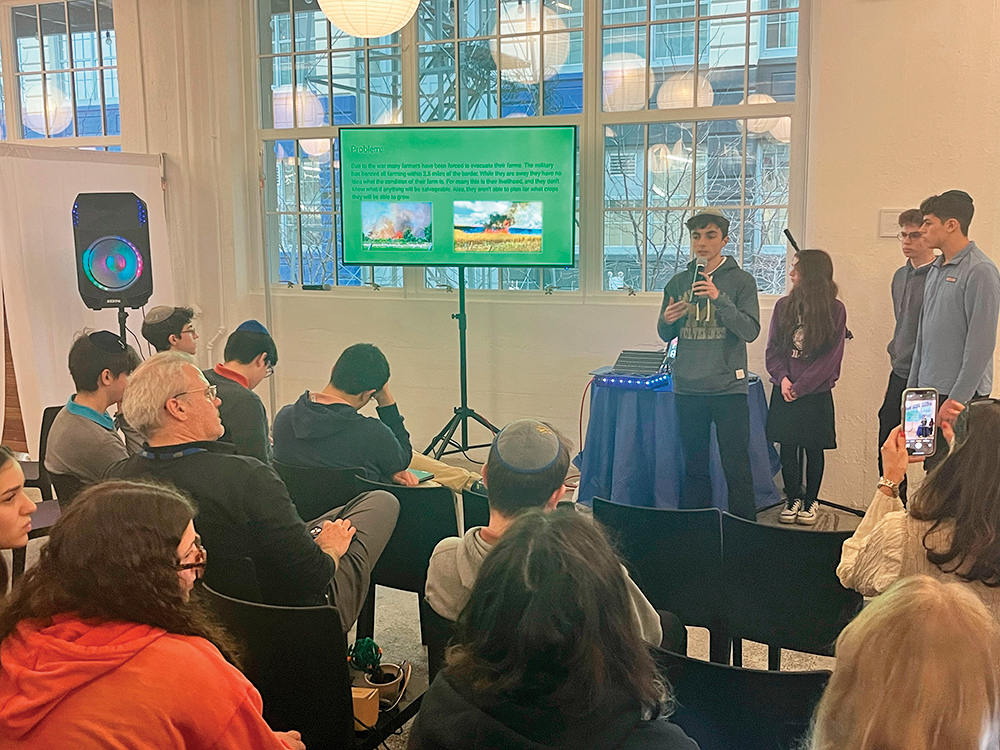
On a dreary Wednesday that would usually be the last day of February, 16 area high schools came together to participate in the sixth Center for Initiatives in Jewish Education (CIJE) Hackathon. At an open warehouse space in Industry City, Brooklyn, that provided views of the cloudy Upper Bay and the Statue of Liberty, hundreds of teenagers tried to use their skills to show just how bright the future might be.
Created in 2001, CIJE coordinates educational programs in more than 175 Jewish schools across the country. Those programs impact the learning of more than 45,000 students each year and focus on both the ever-relevant (collaborating in teams, developing critical thinking skills and finding solutions) and the futuristic (the STEAM component). According to the organization, the goal is to prepare the next generation for innovation by funding programs with advanced technology, developing engaging curricula, and providing ongoing teacher training, mentorship and school visits by engineers.

The premise of the hackathon is that students sit for a presentation that outlines a real-life difficulty and they have the rest of the day to figure out a solution.
While that may sound easy, it is not. Though the students who attend the competition must be taking the CIJE engineering curriculum in their school, they are only allowed to attend one hackathon—most attend during their sophomore year—and don’t have any idea what the problem is before they arrive. Once they find out, they don’t just devise a solution. Each team of four has to design and build a prototype that they can demonstrate; design and code a website that will display the data from their invention; and prepare a three-minute presentation that will bring everything together for their peers and judges at the end of the day.
The teamwork component here is key. Some students are going to be stronger than others in certain areas. They have to figure out which team members are doing which tasks. Most teams brainstormed on which facet of the problem they wanted to address and how they planned on doing that, but after that initial conversation, the scramble ensued. Who builds the physical prototype? Who codes the prototype? Who writes the material on the website? Who codes the website? Who makes up the presentation slides? Who will actually talk to the crowd and judges?

The teams had just over four hours to figure everything out.
“The hackathon is a unique opportunity for students to use the skillset and design principles they’ve learnt in the classroom and apply them to solving real world problems,” said Adam Jerozolim, CIJE’s director of curriculum development. “It empowers them to think and adapt on their own, something not easily offered in the standard classroom environment.”
This year’s challenge was presented in partnership with Leket Israel, an Israeli food bank. A representative from the organization came to speak to the students about the various difficulties that they have faced since the October 7th attacks by Hamas on Israel. The causes of the problems ranged from there being fewer staff members due to reserves in the army being called back into service to a shortage of workers in fields due to the pause on allowing Palestinian workers to cross the border. Issues like food waste and lack of efficiency have plagued Leket Israel during this time of great need.
This year’s event actually introduced a second type of challenge, called the “AI Vehicle Challenge.” Each school was allowed to bring one team to participate in a different category where the problem was more defined, but the solution was very difficult. In this case, it involved building a vehicle that was controlled autonomously by artificial intelligence to collect ripe apples while leaving behind rotten ones and avoiding obstacles. These were represented by a tabletop course where the ripe apples were red balls and the rotten ones were silver.

Teams were given cameras that were able to recognize colors using AI, but they still had to construct a collection apparatus and code the car so that it could respond to what the camera was seeing and therefore move to collect the proper targets. At the end of the day, each team did a trial run on the obstacle course after explaining their decisions. A team from Bi-Cultural Hebrew Academy in Stamford featuring Joseph Bildner, Jake Brenner, Jacob Contente and Roberto Toraty took first place.
“These young innovators may not all pursue careers in engineering, but the experience is likely to imbue them with a lifelong inclination towards generosity, empathy and the application of their talents for the greater good,” said Orly Nadler, CIJE’s director of innovation. “This, in essence, captures the true spirit of education. It’s about molding individuals not just with knowledge, but with the character and perspective to use that knowledge altruistically. That’s the kind of education worth talking about.”
In the main competition, a team from The Leffell School stood out with an extremely innovative idea. With one of their members having just come back from Israel, where she volunteered for Leket, the team decided to target a food-waste issue instead of other tempting topics.

They designed a machine that would measure ethylene (a gas produced as fruits ripen). This would allow Leket to better sort their fruit and send fruits with longer shelf life to locations further away while produce with a shorter predicted life would be used in places closer to the fields.
The team of Avery Brown, Kate Glick, Spencer Kolodny, Eliana Pell and Alex Wigder took the top prize for Leffell, but there were other great projects as well. Another entry of note included a web portal that would help farmers decide which fields should be harvested first based on soil moisture, pH and ethylene levels. Other automated devices were products like a pest detector and automatic dispenser of food for farm animals.

Events like these show the great achievers of the future in the Jewish community and provide opportunities for them to shine. Perhaps one of the event’s attendees will go on to invent something to revolutionize farming in the future. But even if they don’t, the exercise alone is worth it.











